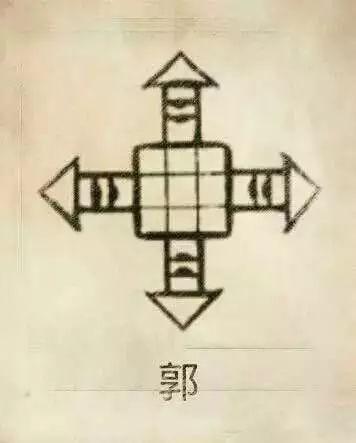The Guo (guō) surname is one of the oldest surnames in China, carrying a diverse origin and a profound historical accumulation. The Guo surname only witnessed the evolution of Chinese civilization but also emerged many influential figures in politics, technology, literature, and other fields. This article will systematically sort out the origin, celebrities, cultural significance, and social impact of the Guo surname, presenting the unique charm of this surname to the readers.

Ⅰ、Origins of the Guo Surname:
1. Xia and Shang Dynasties
Legend has it that Guo Ai and Guo Zhi, two dragon-riding guards who assisted Yu the Great in controlling floods, were among the earliest bearers of the Guo surname. Historical records suggest that the Guo surname may date back over 4,000 years to the Xia Dynasty.
2. Branch of the Ji Clan
During the Western Zhou Dynasty (1046–771 BCE), King Wu of Zhou granted territories to his uncles Guo Zhong and Guo Shu, establishing the Western Guo (in present-day Baoji, Shaanxi Province) and Eastern Guo (in present-day Xingyang, Henan Province). Over time, their descendants adopted "Guo" as their surname. After the Eastern Guo was annexed by the Zheng State, Guo Xu migrated to Yangqu in Shanxi Province, becoming the founding ancestor of the Guo family.
3. Named After Residence
In ancient China, people living outside the city walls often adopted "Guo" as their surname, creating another branch of the Guo family.
4. Ethnic Integration
Hui Ethnic Group: During the Yuan Dynasty, Persian immigrants like Guo Guangde adopted the Guo surname, with descendants settling in Quanzhou, Fujian Province.
Mongolian and Manchu Ethnic Groups: Clans such as Guoerluosi and Guoqili also adopted the Guo surname, enriching the family's diverse heritage.
Ⅱ、Historical Figures
1. Political and Military Figures
Guo Jia (Eastern Han Dynasty): A chief strategist for Cao Cao, Guo Jia's "Ten Victories Theory" played a crucial role in shaping the Three Kingdoms period.
Guo Ziyi (Tang Dynasty): A key general who suppressed the An Lushan Rebellion, Guo Ziyi was enfeoffed as the Prince of Fenyang and is remembered as a national hero.
Guo Wei (Later Zhou Dynasty): The founding emperor of the Later Zhou Dynasty, Guo Wei implemented political reforms that laid the groundwork for the Song Dynasty's unification.
2. Scientific and Academic Figures
Guo Shoujing (Yuan Dynasty): An astronomer and mathematician, Guo Shoujing compiled the Shoushi Calendar, China's longest-used calendar, and designed advanced astronomical instruments.
Guo Pu (Eastern Jin Dynasty): A philologist and writer, Guo Pu annotated ancient texts like Erya and Shanhai Jing, and his Fu on the River is celebrated for its literary brilliance.
3. Literary and Artistic Figures
Guo Moruo (Modern Era): A leading figure in the New Culture Movement, Guo Moruo was a prolific writer, historian, and archaeologist. His poetry collection Goddess revolutionized modern Chinese literature.
Guo Mian (Southern Song Dynasty): The founder of the Zhe School of Guqin, Guo Mian's composition Xiao Xiang Shui Yun is regarded as a masterpiece of Chinese classical music.
4.Diplomatic Pioneers
Guo Songtao (Qing Dynasty): China's first ambassador to the United Kingdom, Guo Songtao's <Make the west journey> played a key role in modernizing China's diplomatic practices.
Ⅲ、Cultural Significance:
1.Ancestral Halls and Clan Names
The Guo family is associated with prominent regional origins, such as Taiyuan (in present-day Shanxi Province) and Fengyi (in present-day Shaanxi Province). Their ancestral halls often bear names like "Fenyang Hall", commemorating Guo Ziyi, or "Zhongwu Hall" , highlighting the family's military achievements.
2.Family Values and Teachings
The Guo family emphasizes virtues such as loyalty, filial piety, and diligence. For example, the Guo family motto from the Qing Dynasty underscores the importance of "virtue, wisdom, loyalty, and sincerity," inspiring future generations to uphold these values.
Ⅳ、Social Impact:
1. Population Distribution and Migration
Today, there are approximately 14.9 million people with the Guo surname. They are primarily concentrated in Henan, Hebei, Shandong, and Hubei provinces.
Over the centuries, the Guo family has migrated southward, reaching as far as Taiwan and Southeast Asia during the Ming and Qing Dynasties.
2. Modern Contributions
Academic Field: Historian Guo Dajun's Research Collection on the War of Resistance has reshaped the study of China's wartime history.
Science and Business: Nobel Prize-winning physicist Guo Yonghuai (a pioneer in aerodynamics) and Hong Kong entrepreneur Guo Bingxiang's family continue the Guo family's legacy of innovation.
Conclusion
The history of the Guo surname is an epic that blends the patriarchal tradition with openness and inclusiveness. From the bloodline inheritance under the of the Guo State to the illustrious military exploits of the Fenyang Wangfu; from the scientific light of the "Shoushi Calendar" to the literary of "The Goddess," the Guo surname not only carries the genetic code of Chinese civilization but also continues to write its brilliance in contemporary society with a posture of keeping with the times. The millennium story of this surname is not only a family memory but also a microcosm of the national spirit.